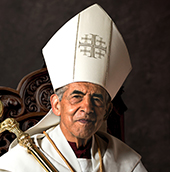About the Church
The Church of the Rose and Cross is an independent and autonomous Church, not Roman Catholic, but Catholic. It is one of thirty or more Catholic Churches in the world which are independent of Rome, such as the Greek Orthodox, the Coptic, the Old Catholic, etc. The orders of the Church of the Rose and Cross were derived through the Old Catholic Church of Holland, which became separate from Rome over three centuries ago. Through this Apostolic Succession, unbroken since the time of Christ, the Church of the Rose and Cross aligns itself with the historic Church in past centuries. It is not a new sect, but a constituent part of the One Holy Catholic and Apostolic Church. There is this difference between the Church of the Rose and Cross and all other Catholic and Protestant Churches; it combines the ancient sacramental worship with the widest measure of intellectual liberty and respect for the individual conscience.
While this is indeed a radical difference, it is not intended as a criticism or a condemnation of any Church which does not accord intellectual or religious liberty. The Church of the Rose and Cross is "Catholic" in that it is universal in the fullest sense of the word. Briefly, it proposes to give to the world the best elements of the Catholic side of Christianity, with the best of Protestantism. On the Catholic side are the seven Sacraments; but they have been hedged about with all kinds of manmade dogmatic restrictions such as creeds, rigid beliefs, the confessional, penances, indulgences and all manner of manmade obstructions.
On the Protestant side we have had an attempt at religious freedom in the Reformation, but the reformers discarded the Sacraments, lost the Apostolic Succession, and soon lost much of the mental emancipation they had gained. We of the Church of the Rose and Cross erect no barriers around the Altar. All who come in a spirit of reverence are welcome to Holy Communion and to the other services of the Church. What intellectual opinions a member holds we consider to be his own affair. The mind that is free is in the best condition for growth. As a man grows into spirituality, so will he grow into perception of truth. No mere lip service or superficial assent of the mind can take the place of such spiritual growth, and to ask anything less than full mental freedom is to inhibit progress.
The clergy are not forbidden to marry and, in accordance with our understanding of God’s will, are encouraged to marry and bear children. They claim no authority over the individual conscience; rather, stress is laid on their function as ministers of the Divine Sacraments, ready to serve those any who may ask their help. The Church of the Rose and Cross stands for intellectual and religious liberty. It feels that the Church should be separate from the State and entirely out of politics while at the same time supporting all those principles and teachings which are necessary for the flourishing of civilization. It teaches the Christianity of the Christ and administers the seven Sacraments which are regarded as channels of Christ's blessing.
It is a Church wherein there is a natural balance between ceremonial worship, devotional aspiration, and scientific and mystical thought. It uses a revised Liturgy in the vernacular which sounds a note of joyous aspiration and welcomes all to its services: those who have faith and those who have lost faith; those who believe in the literal interpretation of the scriptures as well as those who accept the higher understanding of Tradition. Above all, it seeks to serve those who are themselves seeking the Light.
